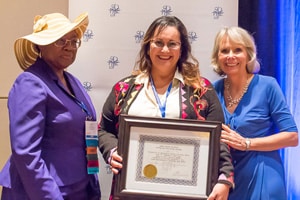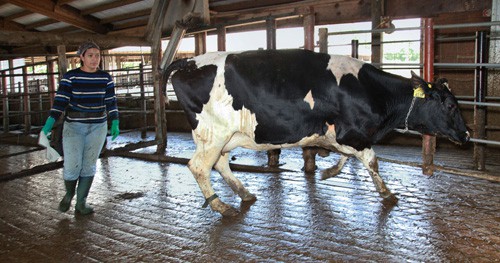APRIL 2018
“The reward for work well done is the opportunity to do more.”
Jonas Salk
 UMASH and the Migrant Clinician’s Network partnered together to develop, train and deliver the Seguridad en las Lecherías project from 2011 – 2016. This successful project has been recognized as the Sarah Mazelis Health Promotion Practice 2017 Paper of the Year award from the editors of Health Promotion Practice.
UMASH and the Migrant Clinician’s Network partnered together to develop, train and deliver the Seguridad en las Lecherías project from 2011 – 2016. This successful project has been recognized as the Sarah Mazelis Health Promotion Practice 2017 Paper of the Year award from the editors of Health Promotion Practice.
The work accomplished with the Seguridad en las Lecherías is being expanded to Minnesota within UMASH to incorporate the training principles with additional health and safety features. The Promoting Safety and Worker Health Project was funded in 2017 and seeks to carry on the good work established. UMASH is looking forward to this “opportunity to do more” by reaching additional farmers and workers in an effort to reduce the injuries on dairy farms.
The article below is re-printed with permission from Migrant Clinicians Network
MCN Paper on Immigrant Dairy Worker Safety & Health Trainings Wins Sara Mazelis Paper of the Year Award!
Tue, 04/17/2018 | by Claire Hutkins Seda
Migrant Clinicians Network’s Seguridad en las lecherías project has once again been honored, this time for a journal article on the Seguridad dairy worker safety and health trainings, entitled “Applying Learning Theory to Safety and Health Training for Hispanic Immigrant Dairy Workers.” Last week, Patricia M. Juárez-Carrillo, PhD, MPH, lead author of the article and co-investigator for the project, accepted the Sarah Mazelis Health Promotion Practice 2017 Paper of the Year award from the editors of Health Promotion Practice, the peer-reviewed journal that published the article. The paper is co-authored by MCN’s Amy K. Liebman, MPA, MA, Director of Environmental and Occupational Health along with our project partners from the National Farm Medicine Center, Iris Reyes, MPH, Yurany Ninco Sánchez, RN, and Matthew Keifer, MD, MPH.
“This is a successful example of collaboration between experts, researchers, and the farmers and workers towards improving occupational safety and health of Hispanic workers through education,” said Dr. Juárez-Carrillo, when reflecting on the award.
The award, named after passionate champion of health education Sarah Mazelis and sponsored by the Society for Public Health Education, was awarded by HPP Editor-in-Chief Kathleen Roe. In an announcement letter, Roe called out the project’s careful attention to the reduction of worker communication inequalities, to cultural competency, and to the thick and complex context — “historical, political, occupational, cultural, linguistic” — that affects workers’ health and their ability to access and effectively implement health and safety information. “These considerations infuse a sound scientific article with the complexities of immigrant experience and practitioner choices in 21st century United States,” Roe concluded.
The award highlights not just the thorough manner in which the researchers approached the topic, but the high level of need among the population. In the last two decades, the dairy world has shifted. Smaller family farms, which once dominated the industry, have given way to industrial-level production, with many hundreds, sometimes thousands of cows on each farm. The consolidation required more workers, and owners turned to a largely immigrant labor force to meet their needs. But health and safety training hadn’t caught up.

Two-thirds of Spanish-speaking dairy workers in Wisconsin participating in Seguridad had never received any training in dairy safety, despite significant risk of injury from handling large animals and operating heavy equipment, and of diseases transmitted through contact with animals and animal waste. A quarter of those workers reported being injured on the job.
Migrant Clinicians Network, in partnership with the National Farm Medicine Center and the Upper Midwest Agricultural Safety and Health (UMASH) and supported by National Institute for Occupational Safety and Health (NIOSH), developed Seguridad en las lecherías as a health and safety intervention for just such immigrant workers in dairy. The project’s model relies on Community Health Workers to provide a train-the-trainer approach, part of a bigger effort to examine the Community Health Worker model on dairies. Initial results of the implementation of the OSHA-approved, five-module bilingual curriculum, which are described in the paper, show an overall knowledge gain of 25 percent among participants. The project underscores MCN’s strength in partnership and our expertise in developing culturally appropriate, evidence-based materials for immigrant workers.
“In all, we trained 850 workers and our curriculum has reached beyond the project with over 50 farms and organizations throughout the US using our training materials. We are now continuing our work with UMASH to expand this project into Minnesota.”
“We were thrilled that over 70 Wisconsin farms welcomed an opportunity to train their workers and make their farms safer,” noted Amy K. Liebman, MPA, MA, Director of Environmental and Occupational Health at MCN and a co-author on the paper.
Additionally, each learning module in Spanish and English is available for download on our website, accompanied by our popular bilingual picture dictionary and other educational materials. As part of the award, the article is made permanently available through open access on the HPP website.
1 Juárez-Carrillo PM, Liebman AK, Reyes IAC, Ninco Sánchez YV, Keifer MC. Applying Learning Theory to Safety and Health Training for Hispanic Immigrant Dairy Workers. Health Promot Pract. 2017;18(4):505-515. DOI: 10.1177/1524839916683668
